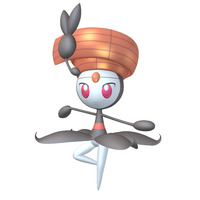Items
In item set
Press and Marketing Materials
-
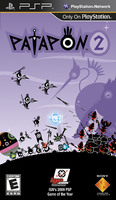 Patapon 2 Patapon 2 is a 2008 rhythm video game developed by Pyramid and Japan Studio and published by Sony Computer Entertainment for the PlayStation Portable. It is a direct sequel to Patapon, and like its predecessor, uses the same unique genre that combines rhythm and strategy. The game was released in Japan in November 2008, in PAL regions in March 2009, in North America in May 2009, and a port for the PlayStation 4 was released on January 30, 2020. A remaster of the game will be included in the compilation Patapon 1+2 Replay, set to be released on July 11, 2025 for Nintendo Switch, PlayStation 5 and Windows. After the Patapon and Zigoton tribe finish the construction of their ship, they set sail to continue their journey to Earthend to gaze upon "IT". After some time at sea, their ship is struck down by a sea monster and both Patapons and Zigotons drift ashore on an unknown island where they encounter a new enemy tribe known as the Karmen and a lone Patapon known as "Hero". The player takes the role of an invisible deity known as The Mighty Patapon and commands the Patapon Tribe to march, attack, defend, and retreat. The game introduces a new way to evolve the Patapon army, and new units to unlock including a singular Hero Patapon that can be used for four-player ad hoc multiplayer mode. A sequel titled Patapon 3 was released on April 12, 2011, in North America, April 15, 2011, in Europe, and on April 28, 2011, in Japan.
Patapon 2 Patapon 2 is a 2008 rhythm video game developed by Pyramid and Japan Studio and published by Sony Computer Entertainment for the PlayStation Portable. It is a direct sequel to Patapon, and like its predecessor, uses the same unique genre that combines rhythm and strategy. The game was released in Japan in November 2008, in PAL regions in March 2009, in North America in May 2009, and a port for the PlayStation 4 was released on January 30, 2020. A remaster of the game will be included in the compilation Patapon 1+2 Replay, set to be released on July 11, 2025 for Nintendo Switch, PlayStation 5 and Windows. After the Patapon and Zigoton tribe finish the construction of their ship, they set sail to continue their journey to Earthend to gaze upon "IT". After some time at sea, their ship is struck down by a sea monster and both Patapons and Zigotons drift ashore on an unknown island where they encounter a new enemy tribe known as the Karmen and a lone Patapon known as "Hero". The player takes the role of an invisible deity known as The Mighty Patapon and commands the Patapon Tribe to march, attack, defend, and retreat. The game introduces a new way to evolve the Patapon army, and new units to unlock including a singular Hero Patapon that can be used for four-player ad hoc multiplayer mode. A sequel titled Patapon 3 was released on April 12, 2011, in North America, April 15, 2011, in Europe, and on April 28, 2011, in Japan. -
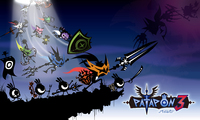 Patapon 3 Patapon 3 (パタポン 3) is a 2011 rhythm video game developed by Pyramid and Japan Studio and published by Sony Computer Entertainment for the PlayStation Portable. It is the final installment in the Patapon series and a sequel to Patapon 2. Gameplay is similar to previous titles, but has a greater focus on multiplayer than Patapon 2. Like its predecessors, Patapon 3 is presented in a cartoonish, silhouetted two-dimensional environment designed by French artist Rolito, now with more detailed backgrounds.
Patapon 3 Patapon 3 (パタポン 3) is a 2011 rhythm video game developed by Pyramid and Japan Studio and published by Sony Computer Entertainment for the PlayStation Portable. It is the final installment in the Patapon series and a sequel to Patapon 2. Gameplay is similar to previous titles, but has a greater focus on multiplayer than Patapon 2. Like its predecessors, Patapon 3 is presented in a cartoonish, silhouetted two-dimensional environment designed by French artist Rolito, now with more detailed backgrounds. -
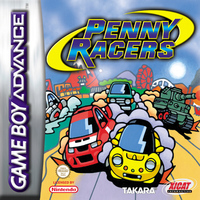 Penny Racers Gadget Racers is a racing game in the Choro Q series. This title differs slightly differently compared to other games. There are no RPG elements to this game, with tracks and races chosen through a menu system similar to a Gran Turismo title rather than talking to other cars.
Penny Racers Gadget Racers is a racing game in the Choro Q series. This title differs slightly differently compared to other games. There are no RPG elements to this game, with tracks and races chosen through a menu system similar to a Gran Turismo title rather than talking to other cars. -
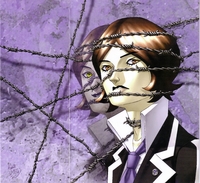 Persona 2: Eternal Punishment Persona 2: Eternal Punishment is a 2000 role-playing video game developed and published by Atlus for the PlayStation. It is a direct sequel to Persona 2: Innocent Sin and chronologically the third installment in the Persona series, a subseries of the Megami Tensei franchise. The game was later remade by Atlus for the PlayStation Portable. This version, released in Japan in 2012, did not receive an overseas release. In response to this, the PlayStation version was released on PlayStation Network in 2013. Eternal Punishment takes place in the fictional Japanese city of Sumaru. Taking place a few months after Innocent Sin, the game follows reporter Maya Amano as she investigates the Joker Curse, a malign phenomenon where people's wishes and rumors are coming true and causing chaos. During her investigations, she and others who join her gain the ability to summon Personas, personified aspects of their personalities. The gameplay features turn-based battle gameplay, where characters use their Personas in battle against demons, and a separate Rumor system, where rumors spread around the city can influence events in the characters' favor, either bad or good. Halfway through the production of Innocent Sin, writer Tadashi Satomi felt that a fresh point of view was needed in addition to Tatsuya, laying the groundwork for Eternal Punishment. Producer Kouji Okada, artist Kazuma Kaneko and composers Toshiko Tasaki, Kenichi Tsuchiya and Masaki Kurokawa also returned. While reusing assets from Innocent Sin, the gameplay and Rumor system were improved upon. The game's theme song, "Change Your Way", was written by English singer-songwriter Elisha La'Verne based on the game's premise. Reception of the game in Japan and the West has generally been positive, with reviewers appreciating improvements over Innocent Sin, the plot, the gameplay systems, and the improved localization compared to the original Persona.
Persona 2: Eternal Punishment Persona 2: Eternal Punishment is a 2000 role-playing video game developed and published by Atlus for the PlayStation. It is a direct sequel to Persona 2: Innocent Sin and chronologically the third installment in the Persona series, a subseries of the Megami Tensei franchise. The game was later remade by Atlus for the PlayStation Portable. This version, released in Japan in 2012, did not receive an overseas release. In response to this, the PlayStation version was released on PlayStation Network in 2013. Eternal Punishment takes place in the fictional Japanese city of Sumaru. Taking place a few months after Innocent Sin, the game follows reporter Maya Amano as she investigates the Joker Curse, a malign phenomenon where people's wishes and rumors are coming true and causing chaos. During her investigations, she and others who join her gain the ability to summon Personas, personified aspects of their personalities. The gameplay features turn-based battle gameplay, where characters use their Personas in battle against demons, and a separate Rumor system, where rumors spread around the city can influence events in the characters' favor, either bad or good. Halfway through the production of Innocent Sin, writer Tadashi Satomi felt that a fresh point of view was needed in addition to Tatsuya, laying the groundwork for Eternal Punishment. Producer Kouji Okada, artist Kazuma Kaneko and composers Toshiko Tasaki, Kenichi Tsuchiya and Masaki Kurokawa also returned. While reusing assets from Innocent Sin, the gameplay and Rumor system were improved upon. The game's theme song, "Change Your Way", was written by English singer-songwriter Elisha La'Verne based on the game's premise. Reception of the game in Japan and the West has generally been positive, with reviewers appreciating improvements over Innocent Sin, the plot, the gameplay systems, and the improved localization compared to the original Persona. -
 Persona 2: Innocent Sin Persona 2: Innocent Sin is a 1999 role-playing video game developed and published by Atlus for the PlayStation. It is the second entry in the Persona series, itself a subseries of the Megami Tensei franchise, and acts as a sequel to the original Persona. The game was re-released in 2011 for the PlayStation Portable. The original version was not localized for western territories; however, the PSP version was released in North America and Europe under the title Shin Megami Tensei: Persona 2 – Innocent Sin. Innocent Sin takes place in the fictional Sumaru City, focusing on a group of high school students from Seven Sisters High School. The protagonist, Tatsuya Suou, and a group of friends must confront a villainous figure called Joker, who is causing the spread of reality-warping rumors through the city. The group are aided in their quest by their Personas, personified aspects of their personalities. The gameplay features turn-based battle gameplay, where characters use their Personas in battle against demons, and a separate Rumor system, where rumors spread around the city can influence events in the characters' favor. Development on Innocent Sin began after the release of the original Persona, and retained most of the original's staff. The game carried over the story themes and basic gameplay mechanics of Persona, while changing and improving on some of the mechanics. The characters were designed by Kazuma Kaneko and Shigenori Soejima. The original release was not localized due to staff shortages and concerns over its content. Reception to the game was generally positive for its original release, but reviews were more mixed for its remake due to its age. A sequel, Persona 2: Eternal Punishment, was released in 2000.
Persona 2: Innocent Sin Persona 2: Innocent Sin is a 1999 role-playing video game developed and published by Atlus for the PlayStation. It is the second entry in the Persona series, itself a subseries of the Megami Tensei franchise, and acts as a sequel to the original Persona. The game was re-released in 2011 for the PlayStation Portable. The original version was not localized for western territories; however, the PSP version was released in North America and Europe under the title Shin Megami Tensei: Persona 2 – Innocent Sin. Innocent Sin takes place in the fictional Sumaru City, focusing on a group of high school students from Seven Sisters High School. The protagonist, Tatsuya Suou, and a group of friends must confront a villainous figure called Joker, who is causing the spread of reality-warping rumors through the city. The group are aided in their quest by their Personas, personified aspects of their personalities. The gameplay features turn-based battle gameplay, where characters use their Personas in battle against demons, and a separate Rumor system, where rumors spread around the city can influence events in the characters' favor. Development on Innocent Sin began after the release of the original Persona, and retained most of the original's staff. The game carried over the story themes and basic gameplay mechanics of Persona, while changing and improving on some of the mechanics. The characters were designed by Kazuma Kaneko and Shigenori Soejima. The original release was not localized due to staff shortages and concerns over its content. Reception to the game was generally positive for its original release, but reviews were more mixed for its remake due to its age. A sequel, Persona 2: Eternal Punishment, was released in 2000. -
 Persona 3 Persona 3, released outside Japan as Shin Megami Tensei: Persona 3, is a 2006 role-playing video game developed by Atlus that is the fourth main installment in the Persona series, which is part of the larger Megami Tensei franchise. It was originally released for the PlayStation 2 in Japan in 2006 and in North America in 2007. It has received several enhanced re-releases and ports: Persona 3 FES, an extended version featuring a new playable epilogue and other changes, was released for the PlayStation 2 in Japan in 2007 and worldwide in 2008. An abridged PlayStation Portable version, Persona 3 Portable, was released in Japan in 2009, North America in 2010, and Europe in 2011, and ported to the Nintendo Switch, PlayStation 4, Windows, Xbox One and Xbox Series X/S in 2023. Persona 3 Reload, a remake of the core game for PlayStation 4, PlayStation 5, Windows, Xbox One and Xbox Series X/S was released on February 2, 2024. In Persona 3, the player assumes the role of a high school student who joins the "Specialized Extracurricular Execution Squad" (SEES), a group of students investigating a temporal anomaly known as the "Dark Hour", during which its members can enter Tartarus, a tower containing monsters called Shadows. They battle the Shadows using a physical manifestation of their psyche called a Persona, which they summon by firing a gun-like object called an "Evoker" at their head. Persona 3 incorporates elements of role-playing and simulation games, as the game's protagonist progresses day by day through a school year and forms relationships that improve their Personas' strength in battle. Reception towards Persona 3 was mainly positive; critics enjoyed its social elements, while some found its combat and environments repetitive. Persona 3 FES's epilogue was said to give narrative closure to the original game, although it was criticized for not featuring its simulation aspects. Persona 3 has also seen other related media, including the fighting games Persona 4 Arena and Persona 4 Arena Ultimax, the rhythm game Persona 3: Dancing in Moonlight, soundtrack albums, musical concerts, radio dramas, a manga, a loosely connected anime series, and an episodic animated film series.
Persona 3 Persona 3, released outside Japan as Shin Megami Tensei: Persona 3, is a 2006 role-playing video game developed by Atlus that is the fourth main installment in the Persona series, which is part of the larger Megami Tensei franchise. It was originally released for the PlayStation 2 in Japan in 2006 and in North America in 2007. It has received several enhanced re-releases and ports: Persona 3 FES, an extended version featuring a new playable epilogue and other changes, was released for the PlayStation 2 in Japan in 2007 and worldwide in 2008. An abridged PlayStation Portable version, Persona 3 Portable, was released in Japan in 2009, North America in 2010, and Europe in 2011, and ported to the Nintendo Switch, PlayStation 4, Windows, Xbox One and Xbox Series X/S in 2023. Persona 3 Reload, a remake of the core game for PlayStation 4, PlayStation 5, Windows, Xbox One and Xbox Series X/S was released on February 2, 2024. In Persona 3, the player assumes the role of a high school student who joins the "Specialized Extracurricular Execution Squad" (SEES), a group of students investigating a temporal anomaly known as the "Dark Hour", during which its members can enter Tartarus, a tower containing monsters called Shadows. They battle the Shadows using a physical manifestation of their psyche called a Persona, which they summon by firing a gun-like object called an "Evoker" at their head. Persona 3 incorporates elements of role-playing and simulation games, as the game's protagonist progresses day by day through a school year and forms relationships that improve their Personas' strength in battle. Reception towards Persona 3 was mainly positive; critics enjoyed its social elements, while some found its combat and environments repetitive. Persona 3 FES's epilogue was said to give narrative closure to the original game, although it was criticized for not featuring its simulation aspects. Persona 3 has also seen other related media, including the fighting games Persona 4 Arena and Persona 4 Arena Ultimax, the rhythm game Persona 3: Dancing in Moonlight, soundtrack albums, musical concerts, radio dramas, a manga, a loosely connected anime series, and an episodic animated film series. -
 Persona 4 Persona 4 is a 2008 role-playing video game by Atlus. It is chronologically the fifth installment in the Persona series, itself a part of the larger Megami Tensei franchise, and was released for the PlayStation 2 in Japan in July 2008, North America in December 2008, and in Europe and Australia in March 2009, being one of the final major exclusives for the system. It was re-released as a PlayStation 2 Classic for the PlayStation 3 in April 2014. Persona 4 takes place in a fictional Japanese countryside and is indirectly related to earlier Persona games. The player-named protagonist is a high-school student who moves into the countryside town of Inaba from the city for a year. During his year-long stay, he becomes involved in investigating mysterious murders with a group of friends while harnessing the power to summon physical manifestations of their psyches known as a Persona. The plot of Persona 4 was inspired by the work of mystery novelists owing to its murder mystery premise. The rural setting was based on a town on the outskirts of Mount Fuji and intended as a "'nowhere' place" and is the central setting to have players sympathize with the daily life of the characters. The developers added many in-game events to prevent the game from becoming stale. During localization, numerous alterations to Japanese cultural references were made to preserve the effect as much as possible. The release of Persona 4 in Japan was accompanied by merchandise such as character costumes and accessories. The game's music was primarily composed by Shoji Meguro, with vocals performed by Shihoko Hirata. The Western releases came with a soundtrack CD with selected music from the game. Persona 4 received critical acclaim and is considered one of the greatest video games of all time, with praise given towards its gameplay, story, emotional depth, characters, and music. An enhanced version of the game, Persona 4 Golden,[b] was released for PlayStation Vita in 2012. It was later ported to Windows, Nintendo Switch, PlayStation 4, Xbox One, and Xbox Series X/S in the early 2020s, selling 2.5 million total copies worldwide. A full remake of the game, Persona 4 Revival is currently in development for PlayStation 5, Windows and Xbox Series X/S. Various other manga and light novel adaptations and spin-offs have been produced. An anime adaptation by AIC ASTA, Persona 4: The Animation, began airing in Japan in 2011, with a Persona 4 Golden anime airing in 2014. The game also spawned two fighting game sequels, Persona 4 Arena and Persona 4 Arena Ultimax, as well as a rhythm game, Persona 4: Dancing All Night. Party members from Persona 4 are prominently featured as playable characters in Persona Q (2014) and Persona Q2 (2018).
Persona 4 Persona 4 is a 2008 role-playing video game by Atlus. It is chronologically the fifth installment in the Persona series, itself a part of the larger Megami Tensei franchise, and was released for the PlayStation 2 in Japan in July 2008, North America in December 2008, and in Europe and Australia in March 2009, being one of the final major exclusives for the system. It was re-released as a PlayStation 2 Classic for the PlayStation 3 in April 2014. Persona 4 takes place in a fictional Japanese countryside and is indirectly related to earlier Persona games. The player-named protagonist is a high-school student who moves into the countryside town of Inaba from the city for a year. During his year-long stay, he becomes involved in investigating mysterious murders with a group of friends while harnessing the power to summon physical manifestations of their psyches known as a Persona. The plot of Persona 4 was inspired by the work of mystery novelists owing to its murder mystery premise. The rural setting was based on a town on the outskirts of Mount Fuji and intended as a "'nowhere' place" and is the central setting to have players sympathize with the daily life of the characters. The developers added many in-game events to prevent the game from becoming stale. During localization, numerous alterations to Japanese cultural references were made to preserve the effect as much as possible. The release of Persona 4 in Japan was accompanied by merchandise such as character costumes and accessories. The game's music was primarily composed by Shoji Meguro, with vocals performed by Shihoko Hirata. The Western releases came with a soundtrack CD with selected music from the game. Persona 4 received critical acclaim and is considered one of the greatest video games of all time, with praise given towards its gameplay, story, emotional depth, characters, and music. An enhanced version of the game, Persona 4 Golden,[b] was released for PlayStation Vita in 2012. It was later ported to Windows, Nintendo Switch, PlayStation 4, Xbox One, and Xbox Series X/S in the early 2020s, selling 2.5 million total copies worldwide. A full remake of the game, Persona 4 Revival is currently in development for PlayStation 5, Windows and Xbox Series X/S. Various other manga and light novel adaptations and spin-offs have been produced. An anime adaptation by AIC ASTA, Persona 4: The Animation, began airing in Japan in 2011, with a Persona 4 Golden anime airing in 2014. The game also spawned two fighting game sequels, Persona 4 Arena and Persona 4 Arena Ultimax, as well as a rhythm game, Persona 4: Dancing All Night. Party members from Persona 4 are prominently featured as playable characters in Persona Q (2014) and Persona Q2 (2018). -
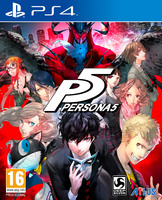 Persona 5 Persona 5 is a 2016 role-playing video game developed by P-Studio and published by Atlus. The game is the sixth installment in the Persona series, itself a part of the larger Megami Tensei franchise. It was released for PlayStation 3 and PlayStation 4 in Japan in September 2016 and worldwide in April 2017. It was published by Atlus in Japan and North America, and by Deep Silver in PAL territories. An enhanced version featuring new content, Persona 5 Royal, was released for PlayStation 4 in Japan in October 2019 and worldwide in March 2020. It was published by Atlus in Japan and worldwide by its parent company Sega. Persona 5 Royal was later released for Nintendo Switch, PlayStation 5, Windows, Xbox One, and Xbox Series X/S in October 2022. Taking place in modern-day Tokyo, the story follows a high school student known by the codename Joker who transfers to a new school after he is framed for assault and put on probation. Over the course of a school year, he and other students awaken to a special power, becoming a group of secret vigilantes known as the Phantom Thieves of Hearts. They explore the Metaverse, a supernatural realm born from humanity's subconscious desires, to steal malevolent intent from the hearts of adults and change their hearts. As with previous games in the series, the party battles enemies known as Shadows using physical manifestations of their psyche known as Personas. The game incorporates role-playing and dungeon crawling elements alongside social simulation scenarios. Persona 5 was developed by P-Studio, an internal development division within Atlus led at the time by game director and producer Katsura Hashino. Along with Hashino, returning staff from earlier Persona games included character designer Shigenori Soejima and music composer Shoji Meguro. Preparatory work began during the development of Persona 4, with full development beginning after the release of Catherine in 2011. First announced in 2013, Persona 5 was delayed from its original late 2014 release date due to being unfinished. Its themes revolve around attaining freedom from the limitations of modern society: the story was strongly inspired by picaresque fiction, and the party's Personas were based on literary outlaws and rebels. Persona 5 has been cited as one of the greatest video games of all time, with praise for its visual presentation, gameplay, story, and music. Including Royal, Persona 5 sold over 10.45 million copies by March 2025, making it the best-selling title in the Megami Tensei franchise. Several pieces of related media have also been produced, including four spin-off games—Dancing in Starlight, Persona 5 Strikers, Persona 5 Tactica, and Persona 5: The Phantom X—as well as manga and anime adaptations. The game's cast has also appeared in other games, with Joker appearing as a playable character in the 2018 crossover fighting game Super Smash Bros. Ultimate.
Persona 5 Persona 5 is a 2016 role-playing video game developed by P-Studio and published by Atlus. The game is the sixth installment in the Persona series, itself a part of the larger Megami Tensei franchise. It was released for PlayStation 3 and PlayStation 4 in Japan in September 2016 and worldwide in April 2017. It was published by Atlus in Japan and North America, and by Deep Silver in PAL territories. An enhanced version featuring new content, Persona 5 Royal, was released for PlayStation 4 in Japan in October 2019 and worldwide in March 2020. It was published by Atlus in Japan and worldwide by its parent company Sega. Persona 5 Royal was later released for Nintendo Switch, PlayStation 5, Windows, Xbox One, and Xbox Series X/S in October 2022. Taking place in modern-day Tokyo, the story follows a high school student known by the codename Joker who transfers to a new school after he is framed for assault and put on probation. Over the course of a school year, he and other students awaken to a special power, becoming a group of secret vigilantes known as the Phantom Thieves of Hearts. They explore the Metaverse, a supernatural realm born from humanity's subconscious desires, to steal malevolent intent from the hearts of adults and change their hearts. As with previous games in the series, the party battles enemies known as Shadows using physical manifestations of their psyche known as Personas. The game incorporates role-playing and dungeon crawling elements alongside social simulation scenarios. Persona 5 was developed by P-Studio, an internal development division within Atlus led at the time by game director and producer Katsura Hashino. Along with Hashino, returning staff from earlier Persona games included character designer Shigenori Soejima and music composer Shoji Meguro. Preparatory work began during the development of Persona 4, with full development beginning after the release of Catherine in 2011. First announced in 2013, Persona 5 was delayed from its original late 2014 release date due to being unfinished. Its themes revolve around attaining freedom from the limitations of modern society: the story was strongly inspired by picaresque fiction, and the party's Personas were based on literary outlaws and rebels. Persona 5 has been cited as one of the greatest video games of all time, with praise for its visual presentation, gameplay, story, and music. Including Royal, Persona 5 sold over 10.45 million copies by March 2025, making it the best-selling title in the Megami Tensei franchise. Several pieces of related media have also been produced, including four spin-off games—Dancing in Starlight, Persona 5 Strikers, Persona 5 Tactica, and Persona 5: The Phantom X—as well as manga and anime adaptations. The game's cast has also appeared in other games, with Joker appearing as a playable character in the 2018 crossover fighting game Super Smash Bros. Ultimate. -
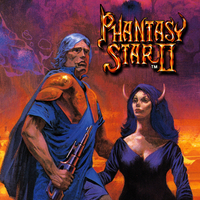 Phantasy Star II A millennium has passed since Alis defeated the ultimate evil in the first Phantasy Star. The planet Motavia of the Algol solar system is no longer the antlion-plagued desert: humans have constructed a sentient computer called "Mother Brain", which could regulate the climate of the planet, turning it into a thriving utopia. One night, a young Motavian government agent named Rolf awakens in his bed after having a nightmare. He sees a young girl fighting a demon, but he is unable to help her. Shortly afterwards, he learns that dangerous bio-monsters have broken free from the laboratories, and is sent there to retrieve a recorder that might contain valuable information about the terrible incident...
Phantasy Star II A millennium has passed since Alis defeated the ultimate evil in the first Phantasy Star. The planet Motavia of the Algol solar system is no longer the antlion-plagued desert: humans have constructed a sentient computer called "Mother Brain", which could regulate the climate of the planet, turning it into a thriving utopia. One night, a young Motavian government agent named Rolf awakens in his bed after having a nightmare. He sees a young girl fighting a demon, but he is unable to help her. Shortly afterwards, he learns that dangerous bio-monsters have broken free from the laboratories, and is sent there to retrieve a recorder that might contain valuable information about the terrible incident... -
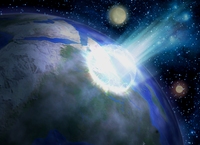 Phantasy Star Online Pioneer 2 finally completed its long voyage to the new home world. But as the ship entered orbit, an enormous explosion shook the entire planet, and all contact with the thousands of people already there was lost. Now, in the first worldwide online console RPG, players from around the globe must unite to discover what has happened. Phantasy Star Online continues in the tradition of one of the most popular series of all time, and becomes a revolutionary and truly global gaming experience in an online, persistent world.
Phantasy Star Online Pioneer 2 finally completed its long voyage to the new home world. But as the ship entered orbit, an enormous explosion shook the entire planet, and all contact with the thousands of people already there was lost. Now, in the first worldwide online console RPG, players from around the globe must unite to discover what has happened. Phantasy Star Online continues in the tradition of one of the most popular series of all time, and becomes a revolutionary and truly global gaming experience in an online, persistent world. -
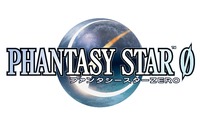 Phantasy Star Ø Phantasy Star Ø (pronounced Zero) is a Japanese-style RPG that borrows elements from Phantasy Star Online and Phantasy Star Universe. Core mechanics are typical for RPGs: destroying monsters gains experience and different levels unlocks higher level gear and powers.
Phantasy Star Ø Phantasy Star Ø (pronounced Zero) is a Japanese-style RPG that borrows elements from Phantasy Star Online and Phantasy Star Universe. Core mechanics are typical for RPGs: destroying monsters gains experience and different levels unlocks higher level gear and powers. -
 Phantasy Star Portable Phantasy Star Portable is based on the Phantasy Star universe and it features a single player mode (including a Story mode) and a multiplayer mode for up to 4 players. The retail version of the game enables the player to import the characters created in the demo version of the game.
Phantasy Star Portable Phantasy Star Portable is based on the Phantasy Star universe and it features a single player mode (including a Story mode) and a multiplayer mode for up to 4 players. The retail version of the game enables the player to import the characters created in the demo version of the game. -
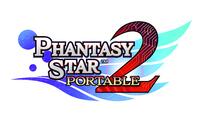 Phantasy Star Portable 2 Phantasy Star Portable 2 is the sequel to Phantasy Star Portable and most of the action RPG gameplay features are similar to its predecessor. The game takes place three years after the events of Phantasy Star Universe when all four races have been defeated and have been sealed off the SEED. In this game the player is part of the private military mercenary group Little Wing on Clad 6, a space colony resort.
Phantasy Star Portable 2 Phantasy Star Portable 2 is the sequel to Phantasy Star Portable and most of the action RPG gameplay features are similar to its predecessor. The game takes place three years after the events of Phantasy Star Universe when all four races have been defeated and have been sealed off the SEED. In this game the player is part of the private military mercenary group Little Wing on Clad 6, a space colony resort. -
 Planescape: Torment Planescape: Torment is a 1999 role-playing video game developed by Black Isle Studios and published by Interplay Entertainment for Windows. The game takes place in locations from the multiverse of Planescape, a Dungeons & Dragons (D&D) fantasy campaign setting. The game's engine is a modified version of the Infinity Engine, which was used for BioWare's Baldur's Gate, a previous D&D game set in the Forgotten Realms. Planescape: Torment is primarily story-driven, with combat taking a secondary role. The protagonist, known as The Nameless One, is an immortal man who forgets everything if killed. The game focuses on his journey through the city of Sigil and other planes to reclaim his memories of previous lives, and to discover why he was made immortal in the first place. Several characters in the game may join The Nameless One on his journey; most of these characters have encountered him in the past or have been influenced by his actions in some way. The game was not a commercial success, but it received critical acclaim and has since become a cult classic, claimed by video game journalists to be the best role-playing video game of 1999. It was lauded for its immersive dialogue, for the dark and relatively obscure Planescape setting, and for the protagonist's unique persona, which shirked many characteristics of traditional role-playing games. It is commonly cited as one of the greatest video games of all time. An enhanced version for modern platforms was made by Beamdog and released for Windows, Linux, macOS, Android, and iOS in April 2017 and for Nintendo Switch, PlayStation 4, and Xbox One in October 2019.
Planescape: Torment Planescape: Torment is a 1999 role-playing video game developed by Black Isle Studios and published by Interplay Entertainment for Windows. The game takes place in locations from the multiverse of Planescape, a Dungeons & Dragons (D&D) fantasy campaign setting. The game's engine is a modified version of the Infinity Engine, which was used for BioWare's Baldur's Gate, a previous D&D game set in the Forgotten Realms. Planescape: Torment is primarily story-driven, with combat taking a secondary role. The protagonist, known as The Nameless One, is an immortal man who forgets everything if killed. The game focuses on his journey through the city of Sigil and other planes to reclaim his memories of previous lives, and to discover why he was made immortal in the first place. Several characters in the game may join The Nameless One on his journey; most of these characters have encountered him in the past or have been influenced by his actions in some way. The game was not a commercial success, but it received critical acclaim and has since become a cult classic, claimed by video game journalists to be the best role-playing video game of 1999. It was lauded for its immersive dialogue, for the dark and relatively obscure Planescape setting, and for the protagonist's unique persona, which shirked many characteristics of traditional role-playing games. It is commonly cited as one of the greatest video games of all time. An enhanced version for modern platforms was made by Beamdog and released for Windows, Linux, macOS, Android, and iOS in April 2017 and for Nintendo Switch, PlayStation 4, and Xbox One in October 2019. -
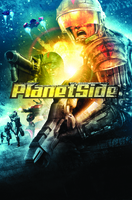 PlanetSide: Aftershock PlanetSide: Aftershock is a bundle of the following games: PlanetSide PlanetSide: Core Combat It also introduces the so-called "Battle Frame Robotics" which are big combat robots similar to Mechs. These are only accessible to advanced players. Previous owners of PlanetSide get access to them without having to buy this game.
PlanetSide: Aftershock PlanetSide: Aftershock is a bundle of the following games: PlanetSide PlanetSide: Core Combat It also introduces the so-called "Battle Frame Robotics" which are big combat robots similar to Mechs. These are only accessible to advanced players. Previous owners of PlanetSide get access to them without having to buy this game. -
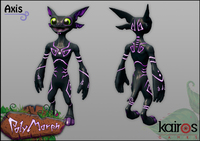 PolyMorph Unreleased game PolyMorph
PolyMorph Unreleased game PolyMorph -
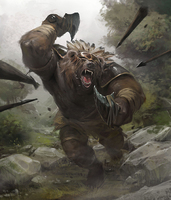 Pox Nora Pox Nora is an online, collectible, turn-based strategy game. Players can take their deck of Runes (cards) and go on an adventure in the many single player campaigns, skirmish against the AI, or battle against other players in player vs player matches. Public decks are available to unlock with gold or by playing the faction walkthrough campaigns. If you like Pox Nora, you can expand your deck options by purchasing additional rune packs that will give you access to more Champions, Spells, Relics and Equipment.
Pox Nora Pox Nora is an online, collectible, turn-based strategy game. Players can take their deck of Runes (cards) and go on an adventure in the many single player campaigns, skirmish against the AI, or battle against other players in player vs player matches. Public decks are available to unlock with gold or by playing the faction walkthrough campaigns. If you like Pox Nora, you can expand your deck options by purchasing additional rune packs that will give you access to more Champions, Spells, Relics and Equipment. -
 Prince of Persia: The Shadow and the Flame This is an enhanced remake of Prince of Persia 2: The Shadow & The Flame first released in 1993. Like Prince of Persia Classic it is a 2D cinematic platformer built with a 3D engine. The story and setting remain faithful to the original: the Prince didn't enjoy happiness with the daughter of the Persian Sultan for long, as Jaffar has returned from the dead. By sorcery and tricks Jaffar made every guard in the land hunt the Prince so he had to flee to a far away land in search of a way to overcome the villain. Aside from the obvious graphical update this version features numerous changes in design of locations, enemies and traps; some scenes were cut out while others were added in. This version is more player-friendly than the original: it features an unlockable map of every level, upgradable combo-moves, instant revive potions and other items. All the items can be bought from in-game shop with coins found in the levels and awarded for killing enemies or purchased with real money if the player wishes so.
Prince of Persia: The Shadow and the Flame This is an enhanced remake of Prince of Persia 2: The Shadow & The Flame first released in 1993. Like Prince of Persia Classic it is a 2D cinematic platformer built with a 3D engine. The story and setting remain faithful to the original: the Prince didn't enjoy happiness with the daughter of the Persian Sultan for long, as Jaffar has returned from the dead. By sorcery and tricks Jaffar made every guard in the land hunt the Prince so he had to flee to a far away land in search of a way to overcome the villain. Aside from the obvious graphical update this version features numerous changes in design of locations, enemies and traps; some scenes were cut out while others were added in. This version is more player-friendly than the original: it features an unlockable map of every level, upgradable combo-moves, instant revive potions and other items. All the items can be bought from in-game shop with coins found in the levels and awarded for killing enemies or purchased with real money if the player wishes so. -
 Pro Cycling Manager Season 2013 Pro Cycling Manager 2013 is a managerial simulation in which the player takes control over a cycling team. There are 80 original pro teams and their riders to choose from. Every aspect around the team can be organized: managing the finances, recruiting new riders, investing in better equipment and improving the morale and fitness of the team members. Good placements in a season let a team climb up in rank. It contains every important classic race and sometimes multiple stages.
Pro Cycling Manager Season 2013 Pro Cycling Manager 2013 is a managerial simulation in which the player takes control over a cycling team. There are 80 original pro teams and their riders to choose from. Every aspect around the team can be organized: managing the finances, recruiting new riders, investing in better equipment and improving the morale and fitness of the team members. Good placements in a season let a team climb up in rank. It contains every important classic race and sometimes multiple stages. -
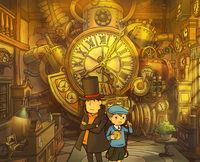 Professor Layton and the Unwound Future Professor Layton and his assistant Luke attend the unveiling of a new invention called a time machine. The Prime Minister of London is volunteered as a test subject, but the machine explodes and there is no trace of him. With the Prime Minister missing, London is in chaos! Shortly after these events, the puzzle-solving pair receive a letter, which has apparently been sent by Luke's future self, stating that London is in serious trouble. The Professor and Luke follow the directions in the letter, which leads them to their most exciting adventure yet...
Professor Layton and the Unwound Future Professor Layton and his assistant Luke attend the unveiling of a new invention called a time machine. The Prime Minister of London is volunteered as a test subject, but the machine explodes and there is no trace of him. With the Prime Minister missing, London is in chaos! Shortly after these events, the puzzle-solving pair receive a letter, which has apparently been sent by Luke's future self, stating that London is in serious trouble. The Professor and Luke follow the directions in the letter, which leads them to their most exciting adventure yet... -
 Proteus Proteus is a 2013 adventure game designed and created by Ed Key and David Kanaga for Microsoft Windows, OS X, Linux, PlayStation 3, PlayStation 4 and PlayStation Vita. In the game, the player traverses a procedurally generated environment without prescribed goals. The world's flora and fauna emit unique musical signatures, combinations of which cause dynamic shifts in audio based on the player's surroundings. The game began development in 2008. Key first conceived Proteus as an open-ended role-playing game akin to The Elder Scrolls IV: Oblivion but, because of the work required for such a project, later redesigned it to be "nontraditional and nonviolent". Audio designer and composer David Kanaga joined the project in 2010. Versions for the PlayStation 3 video game console and Vita handheld console were developed by Curve Studios, whose team added new gameplay features to the Vita edition at Sony's request. Proteus won the prize for Best Audio at the 2011 IndieCade awards, and was a finalist for the 2012 Independent Games Festival's Nuovo Award. Following its release, critics praised the game, especially for its audio features, although some criticised the game's brevity and limited replayability. The game was frequently mentioned in discussions of video games as art, with some debating whether it could be considered a video game at all.
Proteus Proteus is a 2013 adventure game designed and created by Ed Key and David Kanaga for Microsoft Windows, OS X, Linux, PlayStation 3, PlayStation 4 and PlayStation Vita. In the game, the player traverses a procedurally generated environment without prescribed goals. The world's flora and fauna emit unique musical signatures, combinations of which cause dynamic shifts in audio based on the player's surroundings. The game began development in 2008. Key first conceived Proteus as an open-ended role-playing game akin to The Elder Scrolls IV: Oblivion but, because of the work required for such a project, later redesigned it to be "nontraditional and nonviolent". Audio designer and composer David Kanaga joined the project in 2010. Versions for the PlayStation 3 video game console and Vita handheld console were developed by Curve Studios, whose team added new gameplay features to the Vita edition at Sony's request. Proteus won the prize for Best Audio at the 2011 IndieCade awards, and was a finalist for the 2012 Independent Games Festival's Nuovo Award. Following its release, critics praised the game, especially for its audio features, although some criticised the game's brevity and limited replayability. The game was frequently mentioned in discussions of video games as art, with some debating whether it could be considered a video game at all. -
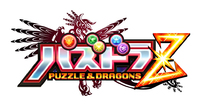 Puzzle & Dragons Z On May 3, 2013, GungHo revealed a spin-off for the Nintendo 3DS named Puzzle & Dragons Z (パズドラZ, Pazudora Zetto) during the Puzzle & Dragons Fan Appreciation Festival 2013. The game was released in Japan on December 12, 2013. Game play is in general identical to the mobile game, but it adds RPG elements such as towns and NPCs. As of July 30, 2014, the game has shipped over 1.5 million copies. A manga about Puzzle & Dragons Z has been serialized in CoroCoro Comic since September 29, 2013, and the first tankōbon volume was released on April 28, 2014.
Puzzle & Dragons Z On May 3, 2013, GungHo revealed a spin-off for the Nintendo 3DS named Puzzle & Dragons Z (パズドラZ, Pazudora Zetto) during the Puzzle & Dragons Fan Appreciation Festival 2013. The game was released in Japan on December 12, 2013. Game play is in general identical to the mobile game, but it adds RPG elements such as towns and NPCs. As of July 30, 2014, the game has shipped over 1.5 million copies. A manga about Puzzle & Dragons Z has been serialized in CoroCoro Comic since September 29, 2013, and the first tankōbon volume was released on April 28, 2014. -
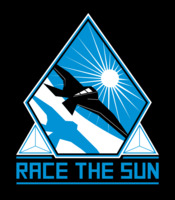 Race the Sun Race the Sun is an endless racer set in an abstract environment. The player controls a solar craft hovering above the surface and it needs to survive as long as possible, racing after the sun that provides the power to move on. The game world is procedurally generated and changes each day. It is divided into regions with a completely different lay-out each day, but with fixed mutators for each region to build a similar difficulty curve for every session.
Race the Sun Race the Sun is an endless racer set in an abstract environment. The player controls a solar craft hovering above the surface and it needs to survive as long as possible, racing after the sun that provides the power to move on. The game world is procedurally generated and changes each day. It is divided into regions with a completely different lay-out each day, but with fixed mutators for each region to build a similar difficulty curve for every session.
